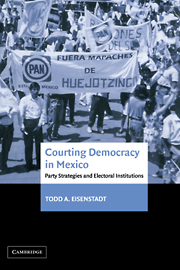Book contents
- Frontmatter
- Contents
- Figures and Tables
- Acknowledgments
- Courting Democracy in Mexico
- 1 Electoral Courts and Actor Compliance: Opposition-Authoritarian Relations and Protracted Transitions
- 2 Ties That Bind and Even Constrict: Why Authoritarians Tolerate Electoral Reforms
- 3 Mexico's National Electoral Justice Success: From Oxymoron to Legal Norm in Just over a Decade
- 4 Mexico's Local Electoral Justice Failures: Gubernatorial (S)Election Beyond the Shadows of the Law
- 5 The Gap Between Law and Practice: Institutional Failure and Opposition Success in Postelectoral Conflicts, 1989–2000
- 6 The National Action Party: Dilemmas of Rightist Oppositions Defined by Authoritarian Collusion
- 7 The Party of the Democratic Revolution: From Postelectoral Movements to Electoral Competitors
- 8 Dedazo from the Center to Finger Pointing from the Periphery: PRI Hard-Liners Challenge Mexico's Electoral Institutions
- 9 A Quarter Century of “Mexicanization”: Lessons from a Protracted Transition
- Appendix A Coding the Postelectoral Conflict Dependent Variable
- Appendix B Coding of Independent Variables
- Bibliography
- Index
4 - Mexico's Local Electoral Justice Failures: Gubernatorial (S)Election Beyond the Shadows of the Law
Published online by Cambridge University Press: 22 September 2009
- Frontmatter
- Contents
- Figures and Tables
- Acknowledgments
- Courting Democracy in Mexico
- 1 Electoral Courts and Actor Compliance: Opposition-Authoritarian Relations and Protracted Transitions
- 2 Ties That Bind and Even Constrict: Why Authoritarians Tolerate Electoral Reforms
- 3 Mexico's National Electoral Justice Success: From Oxymoron to Legal Norm in Just over a Decade
- 4 Mexico's Local Electoral Justice Failures: Gubernatorial (S)Election Beyond the Shadows of the Law
- 5 The Gap Between Law and Practice: Institutional Failure and Opposition Success in Postelectoral Conflicts, 1989–2000
- 6 The National Action Party: Dilemmas of Rightist Oppositions Defined by Authoritarian Collusion
- 7 The Party of the Democratic Revolution: From Postelectoral Movements to Electoral Competitors
- 8 Dedazo from the Center to Finger Pointing from the Periphery: PRI Hard-Liners Challenge Mexico's Electoral Institutions
- 9 A Quarter Century of “Mexicanization”: Lessons from a Protracted Transition
- Appendix A Coding the Postelectoral Conflict Dependent Variable
- Appendix B Coding of Independent Variables
- Bibliography
- Index
Summary
Contracts … have a major drawback: the transaction costs of arranging and enforcing them. Because of these costs, members of a group may find it more welfare maximizing to honor the default rules that third parties have set.
Legal theorist Robert C. EllicksonAmong the most important discretionary powers of the president has been the naming and removal of governors, the president's premier agents in their respective states. The relationship between the president and the governors has been a peculiar one, defying the system of electoral justice successfully imposed at the federal level and routinely violating the federal pact. This chapter details the president's “hiring” and “firing” of the governors, and the governors' “hiring” and “firing” of the mayors, throughout the twentieth century, demonstrating the strong and arbitrary tradition of presidential imposition (whether “papered over” by elections or not), which was only recently cast aside by President Vicente Fox for a new standard of more gentle executive-branch intervention. I argue through discussion of the aggregate cases of presidential appointment and dismissal, as well as through three case studies from the early 1990s, that if the federal electoral courts discussed in the last chapter offered electoral justice success stories, gubernatorial races epitomized institutional failure during the crucial decades of Mexico's protracted transition. Given this broad pre-2000 range in outcomes of the institutions of electoral justice (ranging from institutional accountability at the federal level to widespread failure at the gubernatorial level), I argue that mayoral races occupy the middle of this spectrum between successful and failed electoral justice outcomes.
- Type
- Chapter
- Information
- Courting Democracy in MexicoParty Strategies and Electoral Institutions, pp. 93 - 129Publisher: Cambridge University PressPrint publication year: 2003



